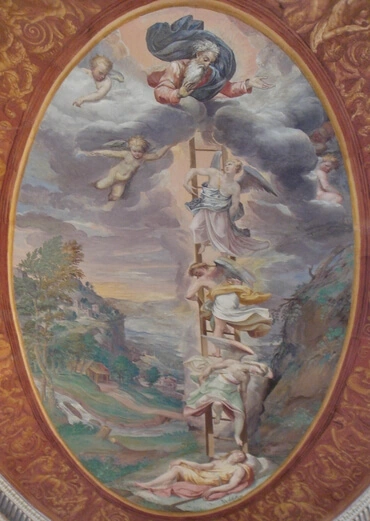Bethel

When Jacob had his famous dream, of a staircase leading to heaven, he named the place "Bethel," which is Hebrew for "the house of God."
That literal meaning is reflected in the spiritual meaning: The Writings tell us that "Bethel" represents the knowledge and understanding we can have about the Lord's divine love, the perfect love which He has for all of us, the perfect love which is His essence. When we know about the Lord's love and have some understanding of it, that gives it a "house" inside us, a way for it to grow inside us and affect our own loves.
In Genesis 28:17, Bethel signifies the Lord's kingdom in the lowermost order. (Arcana Coelestia 3720)
In Amos 3:14, Bethel signifies the divine good. (Arcana Coelestia 2832[10])
"Bethel" has the opposite sense later in the Old Testament, after Jeroboam set up golden calves there and made it a center of idol-worship. Then it represented worship springing from evil loves.
Arcana Coelestia # 1893
1893. That 'Sarai, Abram's wife, bore him no child' means that the Rational Man did not as yet exist will be clear from what is said later on, when Isaac is the subject, for everyone, as has been stated, has an internal man, a rational man which is in between, and an external man, which strictly speaking is the natural man. These, as they existed with the Lord, were represented by Abraham, Isaac, and Jacob - the Internal Man by Abraham, the Rational Man by Isaac, and the Natural Man by Jacob. The Lord's Internal Man was Jehovah Himself, for He was conceived from Jehovah. This was why so many times He referred to Jehovah as His Father, and why in the Word the Lord is called 'the only begotten of God' and 'God's only Son'. The rational man does not exist with anyone when he is first born, only a potentiality to become rational, as may become clear to anyone from the fact that new-born babes do not possess reason but become rational as time goes by through the response of the senses to stimuli from without and from within, as knowledge and cognitions are bestowed on them. Rationality does, it is true, appear to exist with children; but rationality does not in fact do so, only something of the first beginnings of it, as may be recognized from the fact that reason resides with people who are adult and advanced in years.
[2] The Lord's Rational Man is the subject in the present chapter. The Divine Rational itself is represented by Isaac, but the first rational before it had become Divine is represented by Ishmael. Here therefore the statement that 'Sarai, Abram's wife, bore him no child' means that the Divine Rational did not as yet exist. As stated already, the Lord was born in the same way as any other, and as regards what He derived from Mary His mother He was like any other. And because the rational is formed through facts and cognitions which enter in by way of the external senses, or the senses that belong to the external man, His first rational was therefore born as it is with any other. But since everything human in Him was made Divine by His own power, so was the rational made Divine. His first rational is described in the present chapter, and once more in Chapter 21, where again in verses 9-21 Hagar and Ishmael are the subject, where it is said that Ishmael was cast out when Isaac, who represents the Divine Rational, had grown up.






